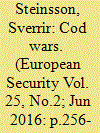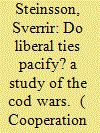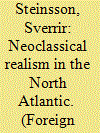|
|
|
Sort Order |
|
|
|
Items / Page
|
|
|
|
|
|
|
| Srl | Item |
| 1 |
ID:
144770


|
|
|
|
|
| Summary/Abstract |
The occurrence and outcomes of the Cod Wars defy both popular and academic expectations. Iceland, a microstate, essentially won four disputes against the UK, a great power. The two states furthermore belonged to a Western security community, sharing significant institutional, economic and cultural ties. This article reviews the history and international relations literature on the Cod Wars to explain and evaluate why the Cod Wars occurred and why Iceland won them. This article also explains what lessons international relations scholarship has learned from the Cod Wars for liberal international relations theory, realism and asymmetric bargaining.
|
|
|
|
|
|
|
|
|
|
|
|
|
|
|
|
| 2 |
ID:
160809


|
|
|
|
|
| Summary/Abstract |
The Cod Wars, three militarized interstate disputes between the UK and Iceland (1958–1961, 1972–1973, 1975–1976), have often been presented as an egregious exception to the liberal peace. There are, however, few comprehensive analyses of the liberal dimensions of the Cod Wars. This article comprehensively analyses the ways in which each of the Cod Wars is consistent or inconsistent with the liberal peace. I find that while the supposedly pacifying factors of the liberal peace – democracy, trade and institutional ties – effectively made the disputes more contentious, they also ensured that escalation to actual war was impossible.
|
|
|
|
|
|
|
|
|
|
|
|
|
|
|
|
| 3 |
ID:
153428


|
|
|
|
|
| Summary/Abstract |
Three things are puzzling about the Cod Wars, three militarized interstate disputes spread over 20 years. First, they occurred between two democratic NATO allies, members of a Western security community. Second, Iceland came close to withdrawing its NATO membership and closing the US base on Icelandic soil, which would have adversely affected the balance of power in the North Atlantic and jeopardized Iceland’s core security interests. Third, Iceland, a microstate, won each of these disputes. Historians and political scientists have consequently found it problematic to account for these puzzling disputes. This study proposes a neoclassical realist account for the occurrence and outcomes of the Cod Wars. I argue that the disputes occurred due to (i) powerful domestic pressures on statesmen to escalate and (ii) elite miscalculation. As the disputes escalated and Iceland’s Western alignment was put at greater risk, statesmen in both countries, mindful of the dangers of realignment, were able to resolve the conflicts in the end. The outcomes of the disputes reflect how British statesmen were able to make greater concessions due to weaker domestic constraints than those faced by Icelandic leaders. Iceland therefore reached a highly favorable agreement in all Cod Wars.
|
|
|
|
|
|
|
|
|
|
|
|
|
|
|
|
| 4 |
ID:
193698


|
|
|
|
|
| Summary/Abstract |
Scholars usually portray institutions as stable, inviting a status quo bias in their theories. Change, when it is theorized, is frequently attributed to exogenous factors. This paper, by contrast, proposes that institutional change can occur endogenously through population loss, as institutional losers become demotivated and leave, whereas institutional winners remain. This paper provides a detailed demonstration of how this form of endogenous change occurred on the English Wikipedia. A qualitative content analysis shows that Wikipedia transformed from a dubious source of information in its early years to an increasingly reliable one over time. Process tracing shows that early outcomes of disputes over rule interpretations in different corners of the encyclopedia demobilized certain types of editors (while mobilizing others) and strengthened certain understandings of Wikipedia’s ambiguous rules (while weakening others). Over time, Wikipedians who supported fringe content departed or were ousted. Thus, population loss led to highly consequential institutional change.
|
|
|
|
|
|
|
|
|
|
|
|
|
|
|
|
| 5 |
ID:
191913


|
|
|
|
|
| Summary/Abstract |
Prominent theories of state formation hold that states formed because of warfare and competition on the one hand, or the diffusion of organizational templates and practices through learning and emulation on the other. We propose that the two strands of theory can be linked to more accurately account for mechanisms of state formation. War, we argue, is an important source of social diffusion. War establishes contacts between political elites across borders, generates migratory flows, and establishes new economic networks. We examine the validity of the theory through a comparative case study of Nordic political units from the dawn of the Viking Age to the end of the High Middle Ages (CE 800–1300), finding that raids, settlements, and conquests by Norwegian and Danish rulers in England, Europe's most advanced kingdom, set in motion state formation processes in Norway and Denmark. In these cases, the winners emulated the losers.
|
|
|
|
|
|
|
|
|
|
|
|
|
|
|
|
|
|
|
|
|